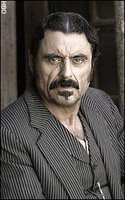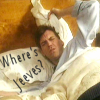
Given this interest and friends’ recommendations, I wanted to give Deadwood a try. Since it is on DVD, seeing the first season, episode by episode, seemed ideal. Because I don’t watch violence easily or lightly in most circumstances, I liked the idea of choosing when and how I’d watch it. And I like Ian McShane from his days in Lovejoy.
I’ve watched the first three episodes now, so I thought I’d weigh in on my response so far. First, this is typical genre stuff. The “Wild West” is as cartoonish as in good-old classic Hollywood westerns, and then you layer on HBO-style “gritty realism” (without ever dipping into actual “reality”). You get tons of swearing, hookers with gonorrhea, drug addiction, and a big death toll from living in a “real” squatter gold town beyond the reach of the U.S. government (Deadwood was, indeed, a real town similar to what is shown on the show—not to mention the name of a popular laid-back bar in Iowa City). You mix in some “real” famous people (Calamity Jane and Wild Bill Hickok) and dance around historical reports of their relationships while making a bunch of crap up as you go along to heighten tension.
Heightening tension gets at the heart of my current response to the series. There is so much tension, so much wondering who will get killed when and by whom, how dastardly will the next murder be…that it keeps my adrenalin flowing at what I can only call a toxic level. SO MUCH fight-or-flight response just isn’t good for my nervous system. Doesn’t matter whether I watch it at night (then have to find some way to come down for the next hour so I can go to sleep) or in the morning (then have to find some way to purge adrenalin that feels like a hit of speed or a dozen cups of coffee); in either case, I feel positively poisoned from riding the tension rollercoaster.
I know some people are addicted to this kind of a ride, and it definitely is a physiological experience as well as an emotional and marginally intellectual one. I’m guessing The Sopranos works similarly on people, as did NYPD Blue. I want to compare it to a literal rollercoaster ride, though for me it lacks the high.
It might help me if there were more character development in these first episodes. McShane’s Al Swearengen is about the best I’ve seen in episodes 1-3, especially if you like watching train wrecks. His depth of unethical, immoral, vicious behavior coupled with sociopathic calm in line delivery is engaging, in its villainous way. But watching him slap around prostitutes or order the murder of children gets exhausting, and predictable, fast.
And Calamity Jane better get more interesting – fast. Such an opportunity, and they have her cower before Swearengen without the (feminist) kindness of having him trigger memories of abuse as a child or some credible reason to bring down this calamitous cross-dresser. Her relationship with Hickok, however unrequited, has great genderbending implications, but so far the show is making her more the butt of jokes than a truly compelling character. She doesn’t have to be Xena, but she should be compelling. But hell, so should Hickok. Not to mention Seth Bullock, the dullest character this side of any western (does he have the ability to look at someone in a way other than up at an angle from beneath his hat/brow, or has someone told the director this is “sexy”?). And Sol Star (oy vey that name) is our token Jew (ho hum).
I do get that Deadwood is a show about westerns even more than it is a western. It’s a postmodern western. It’s a metawestern. But then, not really. I think my biggest criticism is that it isn’t fully in the genre and it isn’t fully outside the genre. Some will say this is its brilliance. But until it has some characters that truly grip me, it’s a long hour. Just pass me some of Alma’s laudanum so I can come down more quickly after the adrenalin poisoning and I’ll try to make it a few more episodes before I move on to something else.


4 comments:
For iconic Westerns without John Wayne, try the Eastwood spaghetti Westerns and some of the James Stewart stuff (Destry Rides Again).
For a very smart deconstruction of Western values, take a look at The Man Who Shot Liberty Valance and The Outlaw Josey Wales.
I look at these movies here and here.
Also, Bitch Ph.D. has a terrific examination of Western values.
Thanks for the reply and the links Deborah. Bitch PhD's comments are often very insightful, and her comments on Brokeback and the Wester were fine, but I don't find them deep or new -- all male genres are often about suppression of emotion (particularly of vulnerability), and what I like about other gender/film theory I've read (see Steve Neale) is focus on male-male interaction and the gaze. (See my comments on Brokeback and Fight Club for this stuff.)
I like your comments on Liberty Valance and Josey Wales. I'm a High Noon gal myself, largely because Katy Jurado was so fantastic and unexpected as a strong Chicana character. Put some of her energy into Deadwood and I bet I'd groove on it.
Yeah, Katy Jurado was amazing. I love High Noon, but one does get tired of seeing Quakers caving in on the non-violence at the last minute. Not a great depiction, there, but a great movie nonetheless.
I loathed Grace Kelly's Amy character and the film's politics in using her to show that sometimes we all just need to pick up a gun.
I do like the film as McCarthy allegory, though.
Post a Comment